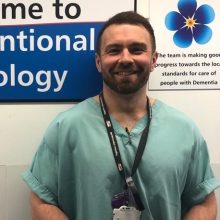Trainee Advanced Practitioner

Meet Luke, a trainee advanced practitioner in the interventional radiology department and lead for the ultrasound-guided cannulation service at the University Hospitals Plymouth NHS Trust. With 14 years of experience in interventional radiology, Luke is a mentor for his colleagues, providing a wealth of insights and support. Luke performs a variety of clinical procedures, including fluoroscopic guided lumbar punctures, CT (Computed Tomography) guided biopsies and diagnostic cerebral angiography.
We recently spoke with Luke to learn more about his decision to pursue advanced practice, the benefits it brings and his future aspirations.
Luke works at Level 7 across the
four pillars of advanced practice
| Clinical | – Fluoroscopic guided lumbar punctures – Arterial access and secondary practitioner role – CT guided biopsy – Diagnostic cerebral angiography |
| Leadership | – Advising on advanced practice for the department – Lead of ultrasound-guided cannulation services – Interventional radiology mentor |
| Education | – Developing and delivering anatomy and physiology for interventional radiology and ultrasound cannulation – General radiography anatomy and physiology soft tissue anatomy |
| Research | – Research into advanced practice and interventional radiology to assess ways to develop the role and interventional radiology service |
.
Why Advanced Practice?
Having gained a considerable amount of experience and expertise within the interventional radiology department, I saw an opportunity to improve patient care within the service. The advanced practice career pathway allowed me to use my previous experience to maximum benefit and further develop myself as a professional. I initially approached the department consultants and clinical lead for their thoughts on my progress as an advanced practitioner. Fortunately, they were supportive and, like me were able to appreciate where this would assist with workload, teaching and service improvement.
What is the best thing about your training?
The program provides support that ensures at least 20% protected education time. This means I have additional time for learning and embedding of new skills.
Why is Advanced Practice good for patients?
Advanced practice means patients can be cared for by the same clinical team member. This brings continuity in their care, which we know improves trust and patient satisfaction. Also, one of the cornerstones of advanced practice is ongoing audit and quality improvement in practice. Reviewing and assessing clinical practice regularly means we make changes where needed to always give the best outcomes for patients.
A further benefit to patients and the service is the delivery of additional education. For example, as an advanced practitioner I educate staff within the service to aid development. I also educate those making referrals to our service, resulting in more appropriate patients being referred where they can benefit from what we offer.
How do you see your future as an Advanced Practitioner?
I see my future as an advanced practitioner, continuing to expand and consolidate my knowledge and skills in interventional radiology. Using my expanded skill set to benefit more patients in the future. I see myself as a trailblazer, I hope to empower and support others along a similar pathway in the future.
Quote from a colleague “Luke can bring great insights not experienced by other trainees. He’s seen thousands of all the procedures from both sides and this gives him a unique perspective…”
Read more South West advanced practice case studies here